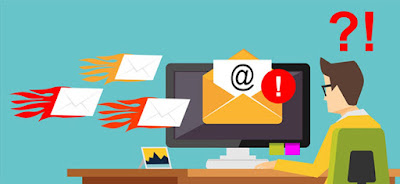WHAT IS EMAIL BOMBARDMENT?


How many times have you checked your email and come across an alert message from your bank or another company warning you, for example, that your account is in danger of being closed?
"Cybercriminals are taking advantage of the growth in online purchases made these days to collect personal and banking information from the most naive buyers".And while these ads often look convincing, they are almost
always phishing scams. If you are not familiar with this term, do not worry, in
this article we explain it to you.
Phishing is one of the most common crimes, within
cybercrime. This crime uses fraud and deception to manipulate its victims by
posing as well-known or trusted companies so that users provide their data.
HOW
TO RECOGNIZE A PHISHING ATTACK?
Nowadays, most attacks are initiated through email, but
they can also be by SMS, instant messages on your social networks, and even
phone calls. And here you will ask yourself “How can I know if I am being the
victim of an attack in any of these ways?
First, cybercriminals contact you to inform you of
suspicious movements in your bank accounts or, they tell you that you are the
winner of a supposed prize in which you have not participated.
Once they get feedback from you, a second email arrives in
which they ask for your data or send you links to pages similar to those of
banks or government institutions where they ask you to fill in all your data in
order to obtain all your information.
In other more current cases, cybercriminals try to
impersonate organizations with relevant information about Covid such as the
Ministry of Health, the Ministry of Health, State Security, etc. Pretending to
give help and advice, or even pretending to be the company you work for.
In most cases they will ask you to open a file urgently or
follow an internet link to get the information. If you follow the link and an
attachment is downloaded and run, cybercriminals can take control of your
device, access your information and personal data, and even encrypt that data.
If you have read any of these examples in your email,
ALERT! You can be the next victim of phishing.
PRACTICES
TO DEFEND AGAINST PHISHING
Although there is no definitive solution to avoid phishing,
here are some tips to prevent this type of problem:
Ø Always
check the sender and do not open messages of unknown origin: In case of opening
the mail, do not click on suspicious links or download attachments to avoid
malware and ransomware.
Ø Make
your brand identity recognizable in the messages you send: Those who do
phishing, even trying to copy, will never be able to copy 100% all the details
that are part of your digital identity.
Ø Banks,
government institutions and companies will never ask you for your information
through emails. If the message talks about money, that is, they tell you, for
example, that you won a prize, it is most likely a scam.
Ø Use antivirus and antispam
software to protect you when malicious messages gain access to your computer.
In addition to antivirus software, it
is essential that you use a password manager to manage your credentials online.
It is vital to have different passwords for all websites, as if there is ever a
data breach, malicious attackers will try to use the discovered credentials
throughout the web.
Comments
Post a Comment